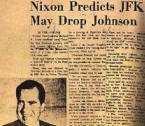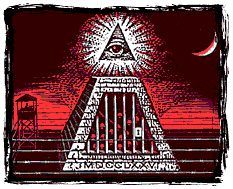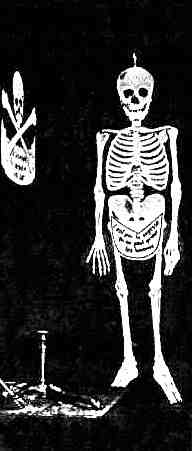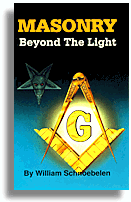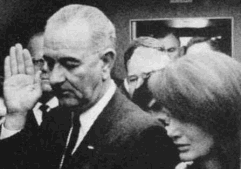 |
||
| In a television interview, A
Current Affair, the mistress of Lyndon Johnson,
Madeleine Brown, described the meeting of 21st November, 1963, when
she was at the home of
Clint Murchison. Others at the meeting included
Harold L. Hunt,
J. Edgar Hoover,
Clyde Tolson,
John J. McCloy and
Richard Nixon. At the end of the evening
Lyndon B. Johnson arrived... "Tension filled the room upon his arrival. The group immediately went behind closed doors. A short time later Lyndon, anxious and red-faced, reappeared... Squeezing my hand so hard, it felt crushed from the pressure, he spoke with a grating whisper, a quiet growl, into my ear, not a love message, but one I'll always remember: "After tomorrow those goddamn Kennedys will never embarrass me again - that's no threat - that's a promise.". It's important to note that John J. McCloy was a member of the now discredited Warren Commission which "investigated" the assassination, appointed by none other than Johnson. Nixon himself was in Dallas on the day of the assassination.
The lead prosecutor in this so called investigation is Sen Arlen Specter. Today, he is Chairman of the Senate Judiciary Committee, insuring that while he is alive, the miscarriage of justice perpetrated on an American president will never be addressed. |

|
||||||||||||
Why Crooked Prosecutors and Judges are Promoted in the Masonic Judicial System
From The Chicago Tribune, January 14, 1999 Break rules, be promoted When former prosecutors were criticized by appeals courts for breaking the rules of a fair trial, their careers weren't sidetracked. Instead they became judges. By Ken Armstrong and Maurice Possley Tribune Staff Writers January 14, 1999 As Cook County prosecutors, Carol Pearce McCarthy, Kenneth Wadas and Patrick Quinn drew scathing rebukes from the Illinois Appellate Court for failing to abide by the rules designed to keep prosecutors honest and trials fair. "Inexcusable," is how the court described McCarthy's misconduct in one case. The state's lawyer disciplinary agency agreed. It took the exceptional step of reprimanding her -- but in a way that kept her identity a secret. "An insult to the court and to the dignity of the trial bar," is what the court called Wadas' trial tactics. Twice, reviewing courts suggested professional disciplinary action might be in order to punish his conduct. As for Quinn, the court wrote "we can hardly imagine a more obfuscating attempt" to characterize his misleading statements to a jury. Quinn prosecuted a sheriff's deputy for official misconduct -- and committed misconduct himself by allowing two witnesses to provide what he knew was misleading testimony, the appellate court ruled. Collectively, the three prosecutors broke enough rules that nine defendants -- four convicted of murder -- were granted new trials on appeal, according to court records. But instead of having their career prospects suffer, all three prosecutors prospered. They were promoted to supervisor in the Cook County state's attorney's office. Then, on the same fall day in 1996, all three were elected judges. Wadas and McCarthy became Cook County Circuit Court judges and are now responsible for enforcing the very rules they sometimes violated. Quinn joined the Illinois Appellate Court -- the court that reviews trial court proceedings. Their path is well traveled. A Tribune analysis of appellate rulings spanning the past two decades turned up 39 other Cook County prosecutors who also became judges after cases they prosecuted were reversed because of misconduct. That group includes former prosecutors denounced for what the courts have deemed some of the worst kinds of misconduct: failing to disclose evidence favorable to a defendant, allowing witnesses to lie or discriminating against African-Americans during jury selection. More often, the misconduct consisted of arguments or cross-examinations that violated a defendant's constitutional rights. In many instances, those prosecutors who became judges had only one reversal. Other Cook County prosecutors engaging in misconduct have gone on to high-ranking positions in the Illinois attorney general's office or in city government. Alexander Vroustouris landed his post as Chicago's inspector general one month before the courts threw out a murder conviction, ruling Vroustouris defied a judge's order by making an improper argument the judge had specifically declared off limits. Those judges and high-ranking state and municipal officials underscore a fundamental reason why misconduct by prosecutors persists. In an environment where prosecutors recite conviction rates like boxers touting won-loss records, the risks are negligible for those who break the rules of a fair trial. Winning a conviction can accelerate a prosecutor's career, but getting rebuked on appeal will rarely stall it, contributing to a culture that fosters misconduct. And the deterrents that confront prosecutors are fearsome only in theory. Here is what usually happens when a prosecutor cheats: Appellate courts uphold the conviction, admonishing the prosecutor not to do it again. When a court does overturn the conviction, it shields the prosecutor from embarrassment, omitting his or her name from the opinion or releasing its ruling in a way that few eyes ever see it. In their rulings, appellate justices sometimes urge lawyer disciplinary officials to punish prosecutors, but such prompting is hollow. Courts have referred numerous prosecutors to the Illinois agency that polices lawyers only to see investigative files get opened and closed with no punishment levied, the Tribune found. There is little threat of financial penalties from a civil lawsuit because courts have granted prosecutors immunity. Courts, though, have carved out narrow exceptions, and some defendants have won settlements. And only rarely are criminal charges filed. Few prosecutors nationally have been indicted, and they were acquitted or, at worst, convicted of a misdemeanor and fined. Three former DuPage County prosecutors face trial next week on charges of framing former Death Row inmate Rolando Cruz. Shelter of anonymity When Carol Pearce McCarthy ran for Cook County judge in 1996, she won the crucial endorsement of the local Democratic Party. For that, she could thank Chicago Mayor Richard M. Daley, who was once her boss as Cook County state's attorney. Daley sang McCarthy's praises to his brother John, a Cook County commissioner and a member of the Democratic panel that slates judicial hopefuls, John Daley recalled in an interview. McCarthy's former colleagues also lauded her, and John Daley passed on those acclamations to the selection committee, calling McCarthy an "outstanding" candidate. John Daley didn't know that appellate justices had previously expressed a dramatically different opinion of McCarthy's work. Nor did he know that she was one of only two prosecutors sanctioned for trial misconduct by the state's lawyer disciplinary agency, going back to its creation in 1973. And it would have been difficult for him to make those discoveries. Disciplinary and court records concerning McCarthy's conduct are layered in secrecy or buried in obscure files. Ask disciplinary officials if McCarthy has ever been sanctioned, and their rules prevent them from mentioning the reprimand that she received. In 1982, McCarthy prosecuted Willie Ray Jr. on a charge of murdering a man during a robbery at a takeout restaurant. An eyewitness identified Ray as the killer, and two other prosecution witnesses provided powerful corroborating evidence. The prosecution's case appeared to be stitched tight, but in the trial's closing act, McCarthy put on a display that would later unravel the work of police, fellow prosecutors, jurors and court personnel. In her final argument, McCarthy resorted to sly hints, unfounded accusations and misstatements of fact and law, a court later determined. She impugned the defense attorney's integrity and invited jurors to engage in improper speculation, intimating that she possessed additional incriminating evidence. "I wish I could give you my file . . . but I'm not allowed to because that is the law," McCarthy told jurors. The jury found Ray guilty, but the verdict was overturned in 1984 by the Illinois Appellate Court, which listed more than a half dozen ways that McCarthy committed misconduct. "The prosecutor's actions in this case read like a veritable hornbook of 'do nots,' " the court wrote. ". . . The State's interest in a criminal prosecution is not that it must win at all costs, but to assure that justice is done . . ." Ray had to be tried again -- and again he was convicted. Although the appellate court was obviously upset with McCarthy, the court extended a standard courtesy that sheltered her from embarrassment. Instead of mentioning her by name in its opinion, the court referred to McCarthy only as "the prosecutor." The Illinois Attorney Registration and Disciplinary Commission -- the Illinois Supreme Court agency charged with policing lawyers -- followed up the appellate court's ruling with its own investigation. In 1986, after McCarthy had already left the state's attorney's office, the commission issued her a reprimand, its weakest sanction. At the time, reprimands were issued confidentially. But the Tribune was able to determine McCarthy's identity because the agency later issued a compendium of its private disciplinary orders. Although all the names were removed, the Tribune matched language from the reprimand order with the appellate ruling in the Ray case, and an examination of the trial transcript identified McCarthy. McCarthy declined requests for an interview. When she appeared before the disciplinary commission, she testified that she had insufficient time to prepare her argument. She told the commission she believed the defense attorney's argument had been unfair and she felt compelled to respond. In its reprimand order, the agency expressed wonder at the fact that McCarthy had received no internal discipline within the state's attorney's office. The Ray case was not the first time the appellate court had criticized McCarthy for misconduct. A year before Ray's conviction was reversed, the court threw out the armed robbery convictions of two men because McCarthy and her trial partner violated the trial judge's order forbidding them from using certain inadmissible evidence. In her final argument, McCarthy disclosed the evidence to jurors and ignored the judge as he sustained repeated defense objections and instructed jurors to disregard her words. In reversing the convictions, the appellate court took the unusual step of naming McCarthy but issued the ruling in an unpublished order. Courts issue their rulings in unpublished orders when they believe a case simply reiterates well-established points of law. Unpublished orders are not included in law books or electronic databases, although copies are placed in defendants' court files. Lawyer disciplinary officials regularly read published opinions for indications of misconduct, but not unpublished orders. McCarthy left the office in 1984 and returned in 1987. In 1990, she was promoted to deputy chief of the narcotics prosecutions bureau. As a judge, she hears abuse and neglect cases in Juvenile Court. The misdeeds of other prosecutors get shrouded in the same ways as McCarthy's. Appellate courts rarely name prosecutors or defense attorneys in their opinions, even when a lawyer is found to have acted abominably. The granting of anonymity isn't mandated anywhere, but instead stems from tradition and professional courtesy. The practice, though, has generated some second-guessing within the ranks of reviewing courts. In a 1983 opinion, the U.S. Supreme Court suggested identifying overzealous prosecutors as a way to chastise them. Still, it rarely happens. Ruth I. Abrams, a justice on Massachusetts' highest court, has urged her colleagues to name prosecutors who commit serious misconduct, citing the substantial costs shouldered by taxpayers, victims and others when a case has to be retried. "We fail in our duty to the public and the bar when we do not penalize publicly those prosecutors who engage in egregious conduct," she wrote. At the same time, the use of unpublished orders has reached staggering levels. In 1996 and 1997, the most recent years for which statistics are available, the Illinois Appellate Court disposed of 91 percent of its criminal cases in unpublished orders. The Tribune found eight unpublished orders issued during the last 13 months in which Cook County convictions were reversed because prosecutors violated the rules of a fair trial. In two of them, prosecutors were found to have discriminated against African-Americans during jury selection. Moving on In 1997, the Illinois Appellate Court reversed the convictions in two separate cases prosecuted by Patrick Quinn, finding that Quinn and his trial partners broke the rules of a fair trial. But by the time those rulings were issued, Quinn had become a member of the appellate court himself. In 1994, Quinn, as an assistant state's attorney, helped prosecute Umberto Perkins, a former Cook County Jail guard accused of official misconduct for helping an inmate to escape. Perkins was found guilty, but three years later the Illinois Appellate Court reversed the convictions and assailed the prosecutors. At trial, two prosecution witnesses, both inmates when the escape occurred, denied receiving anything for testifying against Perkins. In fact, the appeals court said, both had bargained for and received reduced sentences -- a substantial benefit that could have been used to challenge their credibility. By not correcting testimony that was either "substantially misleading or outright false," the court wrote, Quinn and his trial partner violated Perkins' constitutional rights by knowingly using perjured testimony to obtain his conviction. Quinn did not participate in the appellate decision. "I have no comment on the appellate court's ruling," Quinn said recently. "When the appellate court speaks, it speaks." The court's opinion didn't name Quinn or the case's other prosecutor, Christopher Donnelly. And by the time the opinion was issued, Donnelly had moved on as well. In 1994, two months after Perkins was convicted, Donnelly was elected a Cook County Circuit Court judge and hears delinquency petitions in Juvenile Court. In March 1997, just months after Quinn became a judge, the appellate court reversed another defendant's conviction for gun charges because Quinn had unfairly presented evidence suggesting the defendant committed other crimes. The ruling was issued in an unpublished order that didn't name Quinn. A third case Quinn prosecuted was reversed in 1990, while he was still a prosecutor. The appellate court set aside a murder conviction because Quinn engaged in improper cross-examination and final argument. 'An insult to the court' In October of 1983, then-State's Atty. Richard M. Daley promoted Kenneth Wadas to chief of the office's narcotics unit. That probably wasn't what the Illinois Appellate Court had in mind when, five months before, it called Wadas' conduct "an insult to the court and to the dignity of the trial bar," and suggested the possibility of disciplinary action. Wadas, a former Marine who served in Vietnam, drew severe criticism from the courts in 1983. Ultimately, he would be investigated by the state's lawyer disciplinary agency for three cases that he prosecuted. But Wadas wasn't disciplined, and his career didn't suffer. He did, though, learn his lesson and vowed not to make the same mistakes again, Wadas said in a recent interview. In May of 1983, the Illinois Appellate Court ruled on the appeal of Roland Shepard, who had been convicted of attempted murder and other charges. Without naming Wadas, the court called his tactics "reprehensible" and "ugly." Wadas crossed the line that forbids prosecutors from arguing with insults instead of evidence, calling Shepard a "lying, raping, attempt-murdering dog," and saying police "would have done us all a favor by killing him," the court declared. Still, the court upheld Shepard's convictions, ruling that the evidence of guilt was so overwhelming that Wadas' misdeeds had to be considered what the courts call "harmless error." Loath to condone Wadas' conduct, the court suggested there might be a way to punish him. "Perhaps some reports to the Attorney Registration and Disciplinary Commission are required to provide an antidote for this virulent condition," the court wrote. Ruling in a different case in December of 1983, U.S. District Judge Milton Shadur called Wadas' conduct "outrageous." Wadas ran afoul while trying Gilbert Crist for attempted murder by making improper attacks on Crist and Crist's attorney, Shadur said. The judge threw out Crist's convictions and reported Wadas to lawyer disciplinary officials. But a year later, a higher court reinstated Crist's convictions, saying Shadur overstated any harm done by what the court called Wadas' "questionable comments." Also in December of 1983, Robert Earl Wilson's convictions for rape and deviate sexual assault were reversed by the Illinois Appellate Court based in part upon a finding that the prosecutors committed misconduct while arguing the case. The opinion didn't name him, but one of the prosecutors was Wadas, according to trial transcripts. Before those court rulings condemning his tactics were issued, Wadas won murder convictions in March of 1983 against two brothers, Joseph and Kenneth Beringer. But four years later the convictions were reversed. The appeals court took Wadas and his trial partner to task for "brazen misconduct," which included destroying a key witness' credibility with unsubstantiated attacks and impugning the defense attorney's integrity. The Illinois Attorney Registration and Disciplinary Commission investigated Wadas for the Shepard, Crist and Beringer cases, Wadas said recently. And even though he wasn't disciplined, the experience was gut-wrenching, he said. "It's terrifying. My stomach was in knots for months until those matters were resolved," he said. In some instances, Wadas said, he believes he was whipsawed by a shift in how reviewing courts treat different kinds of arguments that prosecutors use. He said tactics that once had passed muster or received only faint criticism became grounds for reversal. Wadas said that any missteps he made while prosecuting cases were unintentional. And he said he took care not to repeat conduct that reviewing courts found objectionable. Wadas went into private practice in 1986, doing mostly criminal defense work. When he ran for judge in 1996, Wadas said he told the lawyer groups that screen judicial candidates about the disciplinary commission investigations. They found him qualified. "I think they probably took into consideration that people mellow with age and reach some balance in their lives," said Wadas, who is 53. Wadas currently presides over cases in Criminal Court. 'Ministers of justice' Reviewing courts have referred prosecutors besides Wadas to Illinois' lawyer disciplinary commission. None was sanctioned. Among those referrals were 13 cases where a court named the prosecutor who committed misconduct in its opinion then either sent its opinion to the disciplinary commission or suggested it investigate, according to a Tribune review of appellate opinions since 1973. But not one of those prosecutors was subsequently disciplined, according to the commission's records. Trial judges and defense attorneys also have referred prosecutors to the disciplinary agency without the referrals being made public, according to disciplinary officials. The Tribune found more than 300 published rulings in the past two decades where a state conviction was reversed because of misconduct by prosecutors. But only McCarthy and one other prosecutor have been sanctioned for trial misconduct, according to agency officials and records. In 1987, a year after McCarthy's private reprimand, Ray Garza was censured for personal attacks upon a defense witness and defense lawyer in a Cook County case he prosecuted, according to commission records. Confidentiality rules prohibit disciplinary commission officials from speaking about specific cases unless the agency has found enough evidence to file a formal complaint of its own. Mary Robinson, the agency's administrator, said the agency does summon some prosecutors before it each year and issues what the commission calls a "station-house adjustment" -- the prosecutor acknowledges making a mistake and agrees not to do it again. In return, no formal complaint is issued. "You don't need to be disbarred to be worried," Robinson said. "I think most people seriously underestimate how worried lawyers are about any contact from (the disciplinary commission). Just getting that (notification) letter is an onerous experience for most lawyers." Also, agency investigators have sought complaints against some prosecutors but were overruled by the agency's inquiry boards, the panels that authorize formal complaints, Robinson said. If some crucial fact is in dispute -- and it's a prosecutor's word against somebody else's -- inquiry board members tend to believe the prosecutors, Robinson said. "Prosecutors are ministers of justice," she said, "and they get some respect for that." Do it by the handbook At the Cook County state's attorney's office, administrators can not recall a single case where a prosecutor has been dismissed for trial misconduct. Current State's Atty. Dick Devine said it hasn't happened during his tenure. Nor did it occur on the watch of his predecessors dating back to 1980 -- Jack O'Malley, Cecil Partee and Richard M. Daley, according to interviews with former officials. Devine, who was elected state's attorney in 1996, said his office is aggressive in attempting to prevent and combat prosecutorial misconduct. He addresses all new prosecutors, quoting from a 1935 U.S. Supreme Court decision that describes the prosecutor's obligation to ensure that trials are fair. His office, which spends between $250,000 and $300,000 a year on training, requires prosecutors to attend classes and seminars, an aide said. Each newly sworn prosecutor is given a handbook on trial practices that draws the lines separating fair and foul. And when a reviewing court reverses a conviction due to the prosecution's misconduct, supervisors review the case with the assistants who tried it, Devine said. The office has a disciplinary process that is "designed to be corrective rather than simply punitive," according to a prepared statement from Devine, and it makes a "clear distinction" between willful acts and those attributable to "lack of experience, an error of judgment, a change in the law" or a need for continuing legal education. An intentional act of misconduct is grounds for dismissal, Devine said. The office has other sanctions, such as written warnings, demotions and suspensions. Citing confidentiality rules, Devine would not say if prosecutors involved in specific cases where misconduct was found received any discipline other than dismissal. 'Harmless error' Courts do not throw out a conviction if a prosecutor's misconduct is what they call "harmless error." Some kinds of misconduct require automatic reversal, such as a finding that prosecutors discriminated during jury selection. But for most kinds of misconduct, courts try to determine if the conduct affected the trial's outcome or was harmless. Between 1993 and 1997, there were 167 published opinions in which the Illinois Appellate Court or Illinois Supreme Court found that prosecutors committed some form of misconduct that could be considered harmless. In 122 of those cases -- or nearly three out of four times -- the reviewing court affirmed the conviction, holding that the misconduct was "harmless," the Tribune found. The misconduct has been as serious as concealing evidence or as juvenile as name calling. Illinois courts have upheld convictions when prosecutors have referred to a defendant as a "mutant from Hell" or "Mr. Mentally Retarded;" to a defense witness as "Miss One Hundred and Fifty Dollars an Opinion;" and to a defense attorney in this way: "She may be small, and she may be a woman, but she's a pretty dirty trial lawyer." When they uphold convictions despite misconduct, the courts often take great pains to stress that their ruling doesn't mean they condone the prosecutor's behavior. The court's conscience In his 18 years on the Illinois Appellate Court, Dom Rizzi struggled to rein in those prosecutors who trampled upon defendants' rights. And he struggled to get other justices to help. "Too many prosecutors are overzealous. Too many prosecutors are more interested in getting a conviction rather than doing justice," he said recently. Some lawyers considered Rizzi the court's conscience, a bold and scholarly justice who was willing, on occasion, to rule by what he thought the law should be, not what it was. Some prosecutors, though, derided him as a lawyer with little experience in the trenches of criminal court. Over the years, Rizzi tried repeatedly to get prosecutors to try cases fairly. In some opinions he scolded the prosecution with acid language. In some he mentioned prosecutors by name. During oral argument, he sometimes asked prosecutors to relay the message to their supervisors that the appellate court was getting fed up with certain tactics. When Rizzi detected a troublesome pattern, he documented it. In one trial, prosecutors said they couldn't provide the defense with tape-recorded police interviews of a witness because they had lost the tape. By a 2-1 vote the court upheld the conviction, but Rizzi dissented and listed 30 other Illinois cases -- including 23 in Cook County -- where evidence had been lost or improperly destroyed by prosecutors and police. "There appears to be a black hole somewhere in the state's evidence vault so condensed that evidence cannot be retrieved from its gravitational field," he wrote. Rizzi frequently faulted prosecutors for misconduct, and he also blamed trial judges and reviewing courts for tolerating it. Rizzi became particularly incensed over what he said was a practice by prosecutors of systematically excluding African-Americans from juries. Although considered unconstitutional, the practice had flourished for decades because reviewing courts applied a test from the U.S. Supreme Court that made it all but impossible to prove discriminatory intent. So, in a 1982 case, Rizzi boldly fashioned a new test and decided prosecutors had flunked it. The Illinois Supreme Court slapped him down, but four years later, the nation's highest court abandoned its old analytical framework for one like Rizzi's. "The U.S. Supreme Court should be ashamed of itself for having tolerated that policy for so long a period of time -- and the Illinois Supreme Court also," Rizzi said. Rizzi also bristles at other ways in which he believes reviewing courts fail to deter misconduct by prosecutors. Too often, he said, courts document misconduct in unpublished orders or treat misconduct as harmless error. "If you do not reverse the conviction where there is prosecutorial misconduct," he said, "there is virtually no way you can be assured that the conduct will not repeat itself in other cases." Rizzi retired from the appellate court in 1996 -- the same year that McCarthy, Wadas and Quinn won election to the bench. |
